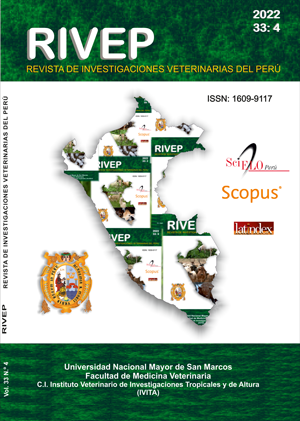Dicistrovirus from the pollinator community found in pigeons: a new viral reservoir?
DOI:
https://doi.org/10.15381/rivep.v33i4.21901Keywords:
dicistrovirus, pigeons, pollinators, environmentAbstract
Dicistroviruses are a family of viruses that affect invertebrates of sanitary and economic importance. Pigeons are also natural reservoirs of pathogens that have caused emerging and re-emerging diseases in humans. Twenty-five pigeons (24 Columba livia and one Zenaida auriculata) were captured in La Plata, Buenos Aires, between May and June 2019. Oropharyngeal/choana and then cloacal swabs were taken from each bird. RNA extraction was performed with Trizol®. For the analysis, 5 μl of total RNA was used for complementary DNA (cDNA) synthesis. The reaction was carried out using multiplex PCR (mPCR) as screening methodology in a final volume of 25 μl. This multiplex PCR amplifies six viruses. As a positive control, a sample previously isolated and characterized in the authors' laboratory as Israeli acute paralysis virus (IAPV) was used, and whose presence was confirmed by screening using specific primers, for a simple PCR, that amplify 185 bp. Fifteen of the samples (60%) were positive for IAPV in both the multiplex PCR and the specific PCR. Additional studies are required to explore the pathogenicity of dicistroviruses in pigeons and to determine if these viruses are the same ones that affect the pollinator community.
Downloads
Downloads
Published
Issue
Section
License
Copyright (c) 2022 María Laura Susevich, Maria Gabriela Echeverria, Javier Origlia

This work is licensed under a Creative Commons Attribution 4.0 International License.
AUTHORS RETAIN THEIR RIGHTS:
a. Authors retain their trade mark rights and patent, and also on any process or procedure described in the article.
b. Authors retain their right to share, copy, distribute, perform and publicly communicate their article (eg, to place their article in an institutional repository or publish it in a book), with an acknowledgment of its initial publication in the Revista de Investigaciones Veterinarias del Perú (RIVEP).
c. Authors retain theirs right to make a subsequent publication of their work, to use the article or any part thereof (eg a compilation of his papers, lecture notes, thesis, or a book), always indicating the source of publication (the originator of the work, journal, volume, number and date).



